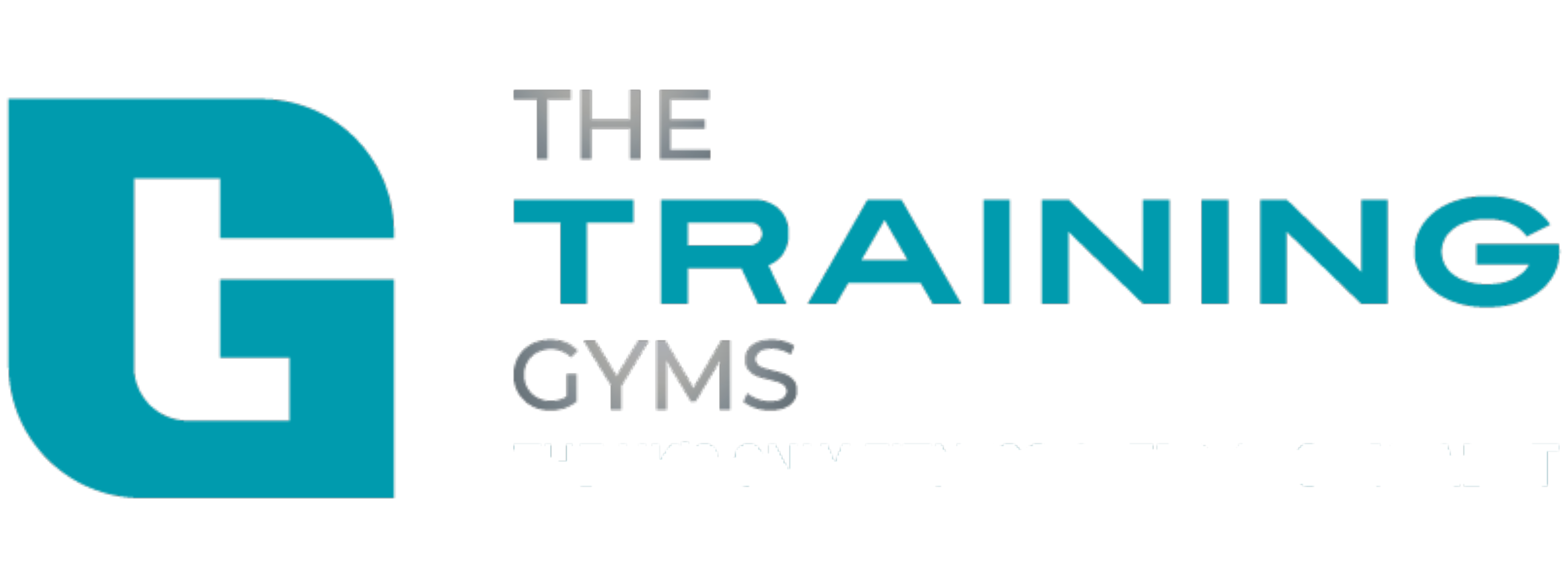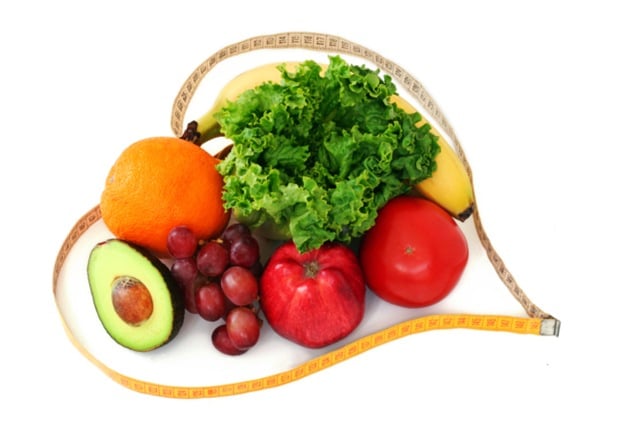Nathan: Hi, I’m Nathan from the DVCC and I am here with Stephen, one of the founders of the DVCC; how are you Stephen?
Stephen: I am great, thanks Nathan, good to see you.
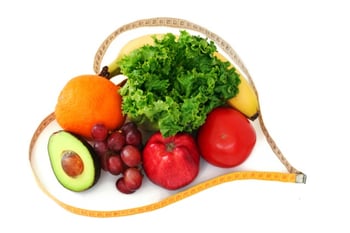 Nathan: Today we’re going to be talking about nutrition and why the DVCC has such a large emphasis on nutrition. So first of all Stephen, could you describe to me briefly what you would describe good nutrition to be?
Nathan: Today we’re going to be talking about nutrition and why the DVCC has such a large emphasis on nutrition. So first of all Stephen, could you describe to me briefly what you would describe good nutrition to be?
Stephen: Yes I can, thanks for that open end massive question, of course I can! Good nutrition really probably relates to what someone’s goals are; but the fundamental premise, certainly one that we follow at the centre, the DVCC, is that health comes first.
So we obviously specialise in losing fat; that is the result, that is the aim that we specialise in and that’s what our clients, on the whole, are really looking to achieve and that’s what we specialise in. But before that comes health; because it is possible to lose, well lose weight, without actually thinking about your health, and doing it in an unhealthy way. That is why there are things like Cambridge diets, Slimfast, other types of low calorie types of diets; ones that don’t worry about what you’re actually ingesting, putting into your body, whether it’s giving you enough nutrients to be healthy, to live daily.
Essentially, one of the fundamental principles as well is that healthy food is a food that allows you to essentially, if you want to boil it down, to live longer healthier; so it is anti-disease; whereas a lot of other types of foods are actually pro-disease; it can be quite a simple distinction between, for example a McDonalds hamburger is pro-disease, whereas a coconut or coconut oil or something of such nature is anti-disease.
So all of the recommendations nutritionally that we make and that form part of the Real You transformation process, the fundamental first principle they have to be in line with is they have to be anti-disease, pro health, essentially.
Nathan: So the DVCC has probably always been known for the training and fat loss; when was nutrition first brought in to be quite a major part of the DVCC?
Stephen: Actually, it’s from the very beginning because we always found, from all the different courses we did and obviously from training people, that you have to tackle nutrition, be it if we are talking fat loss but to be responsible towards health as well.
So it’s no good if a client of ours is training really well but we know that they are eating 5 McDonalds a week and we’re not talking to them about that. Not necessarily that we’re saying that’s really bad, you’ve got to stop that, but educating and motivating that client that they know that that’s not going to get them to their results as fast as they want or can, but also they’re not going to be as healthy whilst doing it.
Because fundamentally, I’m going to throw it out there that most people want to be more healthy; most people, as far as I’m concerned with the clients we have and the clients we encourage that fit in very well, want to live healthier, happier, longer lives and that’s what we’re really fundamentally trying to improve and make happen with any of our nutritional guidance.
Nathan: Touching on what you said about training and continuing to maybe eat foods that maybe aren’t really beneficial to results; if someone was looking to lose body fat quite quickly, would just training be an efficient move to make or would they have to change their nutritional intake to some degree to get the best results?
Stephen: Well it’s an interesting question because you see a lot of these different things: ‘is diet more important than training’, ‘training is more important than diet’; but I think it is too simplistic to look at it in those terms.
What we’ve always found and I know what you have found is that they are not mutually exclusive. So it’s very easy to look at the world through a straw and you see that yes, it’s no good if you’re exercising but you’re eating too many calories, you won’t be able to burn off that body fat. True – however, if you’re exercising well what happens is that, to recover, just to feel better, to feel fitter, you will naturally tend to eat that little bit better. And that happens; we’ve seen it happen before.
So they’re not mutually exclusive but then again you start eating better and then you feel like you want to tone up, build a little bit of muscle tone to feel better, to look better and to be able to be a bit stronger. But one goes with the other; one is not more important than the other as far as I am concerned. Some people find one side of the equation a little bit easier to grasp a little earlier, but they’re not mutually exclusive; they are both as important as each other in my mind.
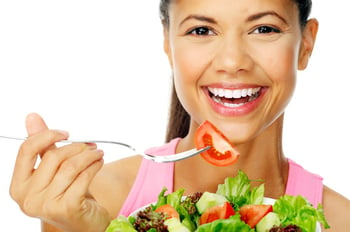 The exercise is not only important for fat loss, sure, but also for being able to be stronger, to live everyday life better, to be fitter, to be able to run round with your children, to feel more confident when you exercise, and - you know this - the hundreds of clients you train with weekly, daily, is that people feel better when they are stronger and they feel more confident about themselves.
The exercise is not only important for fat loss, sure, but also for being able to be stronger, to live everyday life better, to be fitter, to be able to run round with your children, to feel more confident when you exercise, and - you know this - the hundreds of clients you train with weekly, daily, is that people feel better when they are stronger and they feel more confident about themselves.
So I know for myself, I can eat perfectly but I don’t feel as good if I’m not actually exercising as well. You know my body fat composition has probably not changed, but I don’t feel as good.
It’s the same sort of thing and vice versa, if you’re exercising but you are not eating as well, then you tend to not feel as good either. So there is not one or the other in our eyes, that’s why we tackle them both.
Nathan: There’s been a lot of information in the news of late about sugar versus fat – can you just give me your ideas on sugar versus fat? Because a lot of people are saying that sugar is the enemy; a lot of people are saying stay away from natural fats…
Stephen: Ok, so we’re defining fats, natural fats, is that right – things like olive oil?
Nathan: Yes
Stephen: That tends to be the typical wisdom 10-20 years ago which was that, to lose body fat and be healthier, you actually had to cut down the calories and bearing in mind that a gram of fat has more calories than a gram of say sugar or a gram of protein, the wisdom then was that the easiest way to cut down the calories would be to cut down the amount of fat.
Now that has actually been debunked quite a few years ago now, that natural fats in the sense of olive oil, in the sense of avocadoes, coconut oil, things like that, are very beneficial, they are actually, like we were talking about earlier, anti-disease, so they are pro-health. 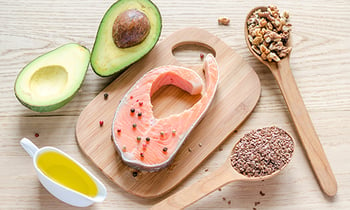 They don’t cause body fat storage, just because they have a few more calories doesn’t mean that you can store more body fat.
They don’t cause body fat storage, just because they have a few more calories doesn’t mean that you can store more body fat.
Hormonally, they are healthier than say when you are eating sugar. Now the thing with sugar is that’s linked with a whole host of different diseases. There’s no getting away from the fact that if you want to be healthier, eating less sugar is one of the best ideas you can have.
You get some people that say, “Oh but I need to have carbs” – there is a very big difference between sugar and carbs; they are not the same. So to say “I need to have sugar”, that’s wrong; you do not need to have sugar; it’s not naturally what we were evolutionary – we didn’t evolve needing sugar – it wasn’t available until we found out a way to make it and process it ourselves.
So besides the health factor, for fat loss, it makes fat loss an awful lot harder. I am not saying you have to be a nun; and you don’t have what we call metabolic reset meals, or a meal that actually is higher in calories and eat more foods than you typically wouldn’t eat every day to day because you know that they are not particularly healthy; that’s fine, but most people tend to kid themselves and do it daily, and don’t realise the amount of actual sugar they are eating every day.
It’s sometimes good just to take it through a day, write it down and work out how much sugar you are actually having; “I’m having 6 cups of tea with a couple of teaspoons of sugar.” That’s a lot of sugar when you boil it up over a year; and for something that is literally pro-disease, it’s not going to help you in 10-15 years time because it all adds up. We obviously revolve around physical transformations, but health is very, very important; we would never compromise health for results.
Our results all come from clients becoming healthier at the same time. You can lose fat and eat sugar, but we would never encourage it because you will be less healthy and your life expectancy is not as high. They are doing a lot of studies now to draw the correlation between… everyone knows on a packet of cigarettes that says it is going to drop 10 years off your life or whatever it says; but it’s a very similar situation that they are beginning to understand with sugar and processed foods like that.
Nathan: I think part of the problem is, for a lot of people, maybe they don’t understand how much sugar they are actually taking in, as you said; not even in terms of how many teaspoons of sugar they put into their tea, but in terms of these healthy drinks or healthy bars that you find, that pretend to be healthy but aren’t necessarily so healthy. If someone was listening to this podcast today and wanted to start making some slight changes to their nutrition, to start helping them to lose fat, what would you say would be the best thing that somebody could start doing?
Stephen: Rather than cutting something out which can be tricky, it’s probably the easiest and this would be the number one recommendation, would be to add in for breakfast a higher protein, higher healthy fat type of breakfast. Some scrambled eggs with some salmon is an ideal fat loss breakfast; it’s also an ideal health breakfast and also an ideal energy breakfast for a child, children going off to school or for an adult going off to work. Not only will it help you lose body fat - doing that daily instead of a typical breakfast which would be a bowl of cereal of some sort or some toast – but it will give you more energy and also makes you healthier at the same time.
Nathan: Awesome. Stephen, we’ll end it there but could you just please recap on what we’ve been talking about today?
Stephen: Just that, at the DVCC certainly and in our overall view, a fat loss nutrition plan has to be a health nutrition plan at the same time. If you become healthier you will lose body fat; it’s not necessarily true that if you lose weight you become healthier. So it’s very important that when looking to physically transform, you do it in a healthy way, because the healthy way will stay with you for the rest of your life.
Nathan: Stephen, thank you very much for taking the time to speak to me today; it’s been an absolute pleasure to talk to you. If you’ve been listening to this podcast, I hope you found it interesting and I hope you have a good day.
Stephen: Thank you Nathan.
Nathan: This is Nathan from the DVCC; have a good day.
